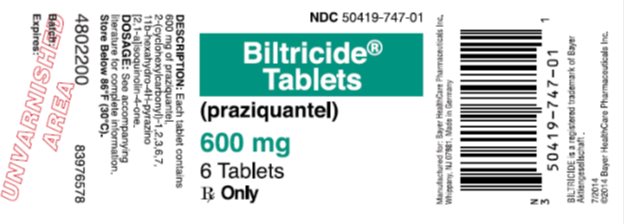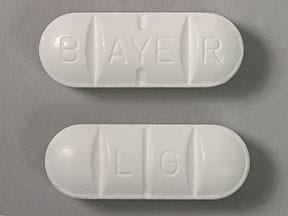Biltricide
Generic name: praziquantel
Drug class: Anthelmintics
Medically reviewed by A Ras MD.
What is Biltricide?
Biltricide is a prescription medicine that is used to treat infections caused by worms.
Description
Biltricide (praziquantel) is an anthelmintic, trematodicide provided in tablet form for oral administration.
Praziquantel is 2-(cyclohexylcarbonyl)-1,2,3,6,7, 11b-hexahydro-4H-pyrazino [2, 1-a] isoquinolin-4-one with the molecular formula; C19H24N2O2. The structural formula is as follows:

Praziquantel is a white to nearly white crystalline powder of bitter taste. The compound is stable under normal conditions and melts at 136 to 140°C with decomposition. The active substance is hygroscopic. Praziquantel is easily soluble in chloroform and dimethylsulfoxide, soluble in ethanol and very slightly soluble in water.
Biltricide tablets contain 600 mg of praziquantel. Inactive ingredients: corn starch, hypromellose, magnesium stearate, microcrystalline cellulose, polyethylene glycol, povidone, sodium lauryl sulfate, and titanium dioxide .
Before taking Biltricide, tell your doctor:
- If you are allergic to Biltricide; any part of this medicine; or any other drugs, foods, or substances. Tell your doctor about the allergy and what signs you had.
- If you have a worm infection of the eye.
- If you have seizures or any other brain or nervous system problem.
- If you are taking any of these drugs: Carbamazepine, dexamethasone, phenobarbital, phenytoin, rifabutin, rifampin, or St. John’s wort.
- If you have taken rifampin within the past 4 weeks.
This is not a list of all drugs or health problems that interact with this medicine.
Tell your doctor and pharmacist about all of your drugs (prescription or OTC, natural products, vitamins) and health problems. You must check to make sure that it is safe for you to take Biltricide with all of your drugs and health problems. Do not start, stop, or change the dose of any drug without checking with your doctor.
What are some things I need to know or do while I take Biltricide?
- Tell all of your health care providers that you take Biltricide. This includes your doctors, nurses, pharmacists, and dentists.
- Avoid driving and doing other tasks or actions that call for you to be alert for 1 full day after taking Biltricide.
- If you drink grapefruit juice or eat grapefruit often, talk with your doctor.
- Some health problems have gotten worse during treatment with Biltricide. Sometimes, these may be life-threatening. If your signs do not get better or get worse, or if you have any new signs during treatment, call your doctor right away.
- Tell your doctor if you are pregnant or plan on getting pregnant. You will need to talk about the benefits and risks of using Biltricide while you are pregnant.
- Tell your doctor if you are breast-feeding. You will need to talk about any risks to your baby.
How is Biltricide best taken?
Use Biltricide as ordered by your doctor. Read all information given to you. Follow all instructions closely.
- Take your doses at least 4 hours apart but not more than 6 hours apart, unless told to do so by your doctor.
- Take with a full glass of water.
- Take with meals.
- The tablet may be broken if the doctor tells you to.
- Do not chew Biltricide.
- Do not hold the tablets or parts of the tablets in your mouth before swallowing. The bitter taste can lead to gagging or throwing up.
- If you cannot swallow Biltricide whole, it may be crushed or dissolved and mixed with soft food or liquid. Take Biltricide within 1 hour of mixing.
What do I do if I miss a dose?
- Take a missed dose as soon as you think about it.
- If it is close to the time for your next dose, skip the missed dose and go back to your normal time.
- Do not take 2 doses at the same time or extra doses.
What are the side effects of Biltricide that I need to call my doctor about immediately?
WARNING/CAUTION: Even though it may be rare, some people may have very bad and sometimes deadly side effects when taking a drug. Tell your doctor or get medical help right away if you have any of the following signs or symptoms that may be related to a very bad side effect:
- Signs of an allergic reaction, like rash; hives; itching; red, swollen, blistered, or peeling skin with or without fever; wheezing; tightness in the chest or throat; trouble breathing, swallowing, or talking; unusual hoarseness; or swelling of the mouth, face, lips, tongue, or throat.
- Seizures.
- Fever.
- Fast or slow heartbeat.
- A heartbeat that does not feel normal.
What are some other side effects of Biltricide?
All drugs may cause side effects. However, many people have no side effects or only have minor side effects. Call your doctor or get medical help if any of these side effects or any other side effects bother you or do not go away:
- Feeling tired or weak.
- Dizziness.
- Headache.
- Belly pain.
- Upset stomach.
These are not all of the side effects that may occur. If you have questions about side effects, call your doctor. Call your doctor for medical advice about side effects.
You may report side effects to the FDA at 1-800-332-1088. You may also report side effects at https://www.fda.gov/medwatch.
If overdose is suspected:
If you think there has been an overdose, call your poison control center or get medical care right away. Be ready to tell or show what was taken, how much, and when it happened.
How do I store and/or throw out Biltricide?
- Store at room temperature.
- Store in a dry place. Do not store in a bathroom.
- Keep all drugs in a safe place. Keep all drugs out of the reach of children and pets.
- Throw away unused or expired drugs. Do not flush down a toilet or pour down a drain unless you are told to do so. Check with your pharmacist if you have questions about the best way to throw out drugs. There may be drug take-back programs in your area.
Label
PACKAGE/LABEL PRINCIPAL DISPLAY PANEL
- Biltricide 600 mg Tablets Bottle Label
- 8339661 NDC 50419-747-01
- Biltricide®
- Tablets
- (praziquantel)
- 600 mg
- 6 Tablets
- Rx Only


SRC: NLM .
